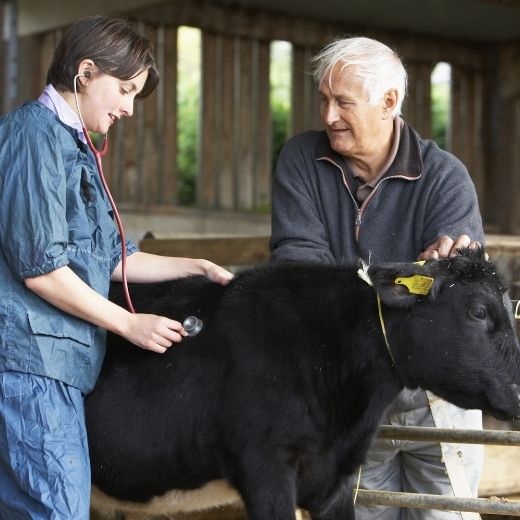The Changing Role of Large Animal Vets
May 28, 2021 | Paul Bootsma

Where are the James Herriots of today’s countryside? James Herriot was a British country vet who wrote loving and humorous tales about his work treating farm animals when farmers needed his help. Ontario has had many of our own heroic country vets, but recently things have changed. Our office has heard concerns that there is a lack of large animal veterinarians across Ontario.
A century after James Herriot’s day, there are far fewer large or farm animal veterinarians who travel the countryside. What has changed? Certainly, consolidation of farm businesses has been a major factor, resulting in fewer farmers. But today’s farmers are able to manage animals better than they could a century ago. Nutritionists have also taken on a role that keeps animals healthy and in good shape. Today’s animals are housed in ideal facilities and have far fewer health challenges.
The animal health landscape has been changing over time. The University of Guelph produces new veterinarians every year, and these do find employment in the field. Today, many vets are in their senior years and are moving onto other pastures through retirement, opening the door for these graduates to enter the career they have trained for.
Large animal vets often spend a few years treating animals on-farm before they move on to a different aspect of veterinarian work. One reason that veterinarians are migrating away from on-the-farm large animal care is that the small animal sector has grown exponentially over the past decades. This sector offers an easier lifestyle than that of a country vet, including a steady income.
For many, it may feel like there is a general shortage of veterinarians, but on the ground, it’s a little more complicated. The problem appears to be regional and to affect some animal sectors, like beef, more than others.
Northern Ontario and parts of East Central Ontario have acknowledged a shortage of large animal vets, which the industry is working on resolving. In Northern Ontario, for example, an Ontario College of Veterinarians working group is developing a strategy to expand large animal veterinary access to meet the needs of Ontario’s beef producers.
Although the role of the country vet has changed as livestock farming has progressed into a specialized industry, the need for veterinarians still remains. It is true that animals require less treatment than in the past. Through genetics, sound nutrition, and healthy facilities, animals do better. Now, veterinarians may be less practitioner, more resource person, program monitor and medicine dispenser. Still, they are an important and valued part of the food industry that produces safe and healthy food for us.
Paul Bootsma is Member Relations Manager for the Christian Farmers Federation of Ontario. The CFFO Commentary represents the opinions of the writer and does not necessarily represent CFFO policy. The CFFO Commentary is heard weekly on CFCO Chatham, CKXS Chatham, CKNX Wingham, and CHLP Listowel.
 Skip to main content
Skip to main content